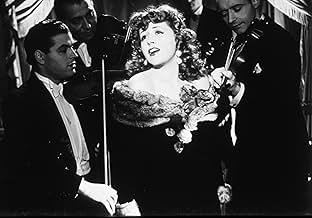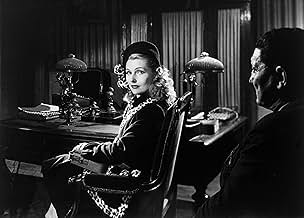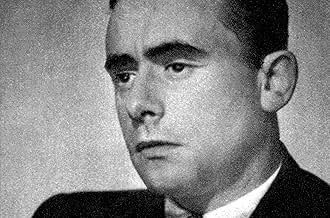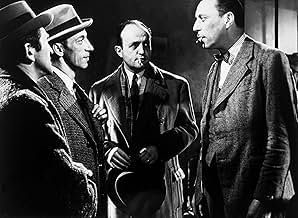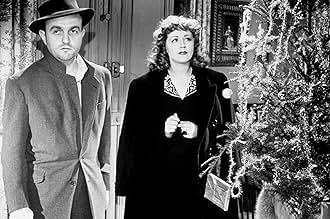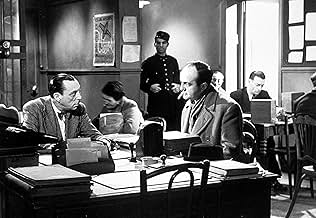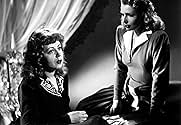VALUTAZIONE IMDb
7,7/10
6690
LA TUA VALUTAZIONE
Aggiungi una trama nella tua linguaA jealous husband intends to kill the man his wife is meeting for business, but arrives to find the deed already done.A jealous husband intends to kill the man his wife is meeting for business, but arrives to find the deed already done.A jealous husband intends to kill the man his wife is meeting for business, but arrives to find the deed already done.
- Regia
- Sceneggiatura
- Star
- Premi
- 2 vittorie e 1 candidatura in totale
Henri Arius
- Léopardi
- (as Arius)
Charles Blavette
- Le gendarme Poitevin
- (as Blavette)
René Blancard
- Le commissaire principal de la P.J.
- (as R. Blancard)
Robert Dalban
- Paulo
- (as R. Dalban)
Jean Daurand
- L'inspecteur Picard
- (as J. Daurand)
Jean Dunot
- Nitram
- (as J. Dunot)
Jacques Grétillat
- Auguste
- (as J. Grétillat)
Gilberte Géniat
- Mme Beauvoir
- (as G. Géniat)
Gabriel Gobin
- Le patron du bistrot
- (as G. Gobin)
François Joux
- L' officier de police Fayard
- (as F. Joux)
Recensioni in evidenza
First of all,there is a detective story:"légitime défense" by Belgian Stanislas André Steeman whose "l'assassin habite au 21" Clouzot had already transferred to the screen in 1942,with Pierre Fresnay and the same actress Suzy Delair.Steeman complained about Clouzot's adaptation for both movies.The movie from 1942 was excellent,but the "detective story" side had been kept,so why complaining?As for "Quai des orfèvres",Clouzot was now in a new phase of his brilliant career.After having directed "le corbeau" and been blacklisted,he had a lot more to say than a simple whodunit.Steeman complained essentially about the poor detective ending,which I will not reveal of course,but Clouzot focused on the social vignettes,on his characters's psychology,and he did not give a damn about the puzzle à la Agatha Christie.By doing so,he becomes the genuine predecessor of CLaude Chabrol who has always been closer to him than to Alfred Hitchcock whom he admires much though. Suzy Delair has great screen presence,and you will love the song she really sings(she was a singer too)"avec son tralala".Bernard Blier gives ,as ever,a sparing of gestures and words performance,and he really pulls it off .Two characters are particularly interesting and disturbing:the first one,Dora,the photographer:she takes pictures of female models ,and Clouzot,by subtle touches,reveals us she's a lesbian.Of course,the word is never uttered(How could it be in 1947?) The police chief (fabulous Louis Jouvet) tells her:"You and me,WE are not lucky with women."The portrait of this cop is very detailed:we learn a lot of things about him,not necessarily connected with the Delair/Blier plot:he's a widower ,with a son he adores and who runs into school difficulties,particularly in geometry.So we get to know all the characters in depth.One of the most important manifesto of post-war French cinema.
Henri-Georges Clouzot's "Quai des Orfevres" (1947) stars Suzy Delair, Bernard Blier, Louis Jouvet, and Charles Dullin. The story takes place in post-war Paris, where an accompanist, Maurice Martineau (Blier) lives with his singer wife, Marguerite, better known as Jenny Lamour (Suzy Delair). An important man, Georges Brignon (Dullin) promises Jenny work, and because she's ambitious, she flirts with him. Maurice is an extremely jealous man, so he finds Brignon in a restaurant and threatens him.
Later on, Jenny tells Maurice she is visiting her grandmother, who lives in another town. This gives Maurice a good opportunity to bump off Brignon, especially when he finds the man's address on a piece of paper in the kitchen and realizes Jenny was lying. But when he gets to Brignon's house, Brignon is already dead.
Inspector Antoine (Juvet) is assigned to the case, and it doesn't take him long to realize that some alibis aren't very secure.
Wonderful film, with the excellent Juvet outstanding as Inspector Antoine, and an excellent performance by Simone Renant as a lesbian photographer, Dora, in love with Jenny. Delair, who was involved with Clouzot, is good as a lower-class woman who loves her husband but wants to get ahead in show business as well.
This is Clouzot at his best, with a witty script with some plot twists and a true Parisian atmosphere.
Later on, Jenny tells Maurice she is visiting her grandmother, who lives in another town. This gives Maurice a good opportunity to bump off Brignon, especially when he finds the man's address on a piece of paper in the kitchen and realizes Jenny was lying. But when he gets to Brignon's house, Brignon is already dead.
Inspector Antoine (Juvet) is assigned to the case, and it doesn't take him long to realize that some alibis aren't very secure.
Wonderful film, with the excellent Juvet outstanding as Inspector Antoine, and an excellent performance by Simone Renant as a lesbian photographer, Dora, in love with Jenny. Delair, who was involved with Clouzot, is good as a lower-class woman who loves her husband but wants to get ahead in show business as well.
This is Clouzot at his best, with a witty script with some plot twists and a true Parisian atmosphere.
10jotix100
"Quai des Orfevres", directed by the brilliant Henri-Georges Clouzot, is a film to treasure because it is one of the best exponents of French film making of the postwar years. M. Clouzot, adapting the Steeman's novel, "Longtime Defence", shows his genius in the way he sets the story and in the way he interconnects all the characters in this deeply satisfying movie that, as DBDumonteil has pointed out in this forum, it demonstrates how influential Cluzot was and how much the next generation of French movie makers are indebted to the master, especially Claude Chabrol.
The crisp black and white cinematography by Armand Thirard has been magnificently transferred to the Criterion DVD we recently watched. Working with Clouzot, Thirard makes the most of the dark tones and the shadows in most of the key scenes. The music by Francis Lopez, a man who created light music and operettas in France, works well in the context of the film, since the action takes place in the world of the music halls and night clubs.
Louis Jouvet, who is seen as a police detective, is perfect in the part. This was one of his best screen appearances for an actor who was a pillar of the French theater. Jouvet clearly understood well the mechanics for the creation of his police inspector who is wiser and can look deeply into the souls of his suspects and ultimately steals the show from the others. In an unfair comment by someone in this page, Jouvet's inspector is compared with Peter Falk's Columbo, the television detective. Frankly, and no disrespect to Mr. Falk intended, it's like comparing a great champagne to a good house wine.
Bernard Blier is perfect as the jealous husband. Blier had the kind of face that one could associate with the man consumed with the passion his wife Jenny Lamour has awakened in him. Martineau is vulnerable and doesn't act rationally; he is an easy suspect because he has done everything wrong as he finds in the middle of a crime he didn't commit, but all the evidence points to the contrary.
The other great character in the film is Dora, the photographer. It's clear by the way she interacts with Jenny where her real interest lies. Simone Renant is tragically appealing as this troubled woman and makes an enormous contribution to the film. Suzy Delair, playing Jenny, is appealing as the singer who suddenly leaps from obscurity to celebrity and attracts the kind of men like Brignon, the old lecher.
The film is one of the best Clouzot directed during his distinguished career and one that will live forever because the way he brought all the elements together.
The crisp black and white cinematography by Armand Thirard has been magnificently transferred to the Criterion DVD we recently watched. Working with Clouzot, Thirard makes the most of the dark tones and the shadows in most of the key scenes. The music by Francis Lopez, a man who created light music and operettas in France, works well in the context of the film, since the action takes place in the world of the music halls and night clubs.
Louis Jouvet, who is seen as a police detective, is perfect in the part. This was one of his best screen appearances for an actor who was a pillar of the French theater. Jouvet clearly understood well the mechanics for the creation of his police inspector who is wiser and can look deeply into the souls of his suspects and ultimately steals the show from the others. In an unfair comment by someone in this page, Jouvet's inspector is compared with Peter Falk's Columbo, the television detective. Frankly, and no disrespect to Mr. Falk intended, it's like comparing a great champagne to a good house wine.
Bernard Blier is perfect as the jealous husband. Blier had the kind of face that one could associate with the man consumed with the passion his wife Jenny Lamour has awakened in him. Martineau is vulnerable and doesn't act rationally; he is an easy suspect because he has done everything wrong as he finds in the middle of a crime he didn't commit, but all the evidence points to the contrary.
The other great character in the film is Dora, the photographer. It's clear by the way she interacts with Jenny where her real interest lies. Simone Renant is tragically appealing as this troubled woman and makes an enormous contribution to the film. Suzy Delair, playing Jenny, is appealing as the singer who suddenly leaps from obscurity to celebrity and attracts the kind of men like Brignon, the old lecher.
The film is one of the best Clouzot directed during his distinguished career and one that will live forever because the way he brought all the elements together.
Quai des Orfèvres is directed by Henri-Georges Clouzot and Clouzot co-writes the screenplay with Jean Ferry. It is based on the novel Legitime defense written by Stanislas-André Steeman . it stars Louis Jouvet, Suzy Delair, Bernard Blier and Simone Renant. Music is by Francis Lopez and cinematography by Armand Thirard.
When high profile business man Georges Brignon is found murdered all evidence points to jealous husband Maurice Martineau - Inspector Antoine takes up the case.
Following the backlash and fallout from Le Corbeau in 1943, Henri-Georges Clouzot wasn't allowed to make a film for four years, his return brought about Quai des Orfevres. Although a highly respected master of his craft, Clouzot was frowned upon for the dark approach to human nature in some of his films, whilst his treatment of the actors under his direction is legendary in a bad way. So how interesting to find that his comeback picture is actually one of his most accessible, very much thriving on human interest factors for literally everyone in the picture!
This a traditional police who done it procedural in core essence, one that does come with coincidences and contrivances, and yet the characters are so richly drawn, their lives so compelling, that the simplicity of plot is actually irrelevant. We are in post war Paris and the back drop is the world of theatre and nightclubs. Clouzot offers up in the fist instance some film noir staples, a possible femme fatale, gay love from afar, cuckold husband and a grotesque murder victim. Even the acts on the stage have a weirdness to them, Wheeling Winos - one with a paper mache head! Dogs that walk on their hind legs! How wonderful. The clubs are smoky, the streets dimly lighted for menacing atmosphere, Clouzot and Thirard have created a splendid moody world from which to spin the tale.
I'll take him for a ride, and what a ride!
Pitched at the front is Jenny Lamour (Delair), who is not beyond using her sexuality to further her stage career, which of course doesn't sit well with her highly jealous husband Maurice (Blier), a man clearly punching above his weight with Jenny. Ah but Clouzot is a crafty devil, he has let us into a secret that undermines us the viewer's expectations and that of Maurice. This keeps the question of who is the murderer - and the motive - as a constant intrigue. There's little slices of sexy sauce to tantalise, and the whole play developes into a sort of tragic comedy, but always the characterisations of the key players are earthy and dealing in foibles. Then Inspector Antoine (Jouvet excellent) holds court, a grumpy but stoically deceptive man of his work, film noir has itself another policeman of note.
Visually there's some treats, such as the dark shadowy walk that Maurice takes to Villa St Marceaux, arriving at the house which instantly looks like a noir nightmare. Better still is a sequence as we get towards the denouement, Maurice in a holding pen, a sexy lady in the pen next door, as bells ring out she is framed in shadowed bars whilst Maurice's mind begins to fracture. The craft on show is sublime at times, visually and on the page. I'm not over enamoured with Delair as an actress, but conversely Renant is quality and gorgeous into the bargain, while I think the ending should have really gone into black hearted territory. All told though, and this is Clouzot's least suspenseful film that I have seen, this is well worthy of time investment for lovers of classic French cinema. 7.5/10
When high profile business man Georges Brignon is found murdered all evidence points to jealous husband Maurice Martineau - Inspector Antoine takes up the case.
Following the backlash and fallout from Le Corbeau in 1943, Henri-Georges Clouzot wasn't allowed to make a film for four years, his return brought about Quai des Orfevres. Although a highly respected master of his craft, Clouzot was frowned upon for the dark approach to human nature in some of his films, whilst his treatment of the actors under his direction is legendary in a bad way. So how interesting to find that his comeback picture is actually one of his most accessible, very much thriving on human interest factors for literally everyone in the picture!
This a traditional police who done it procedural in core essence, one that does come with coincidences and contrivances, and yet the characters are so richly drawn, their lives so compelling, that the simplicity of plot is actually irrelevant. We are in post war Paris and the back drop is the world of theatre and nightclubs. Clouzot offers up in the fist instance some film noir staples, a possible femme fatale, gay love from afar, cuckold husband and a grotesque murder victim. Even the acts on the stage have a weirdness to them, Wheeling Winos - one with a paper mache head! Dogs that walk on their hind legs! How wonderful. The clubs are smoky, the streets dimly lighted for menacing atmosphere, Clouzot and Thirard have created a splendid moody world from which to spin the tale.
I'll take him for a ride, and what a ride!
Pitched at the front is Jenny Lamour (Delair), who is not beyond using her sexuality to further her stage career, which of course doesn't sit well with her highly jealous husband Maurice (Blier), a man clearly punching above his weight with Jenny. Ah but Clouzot is a crafty devil, he has let us into a secret that undermines us the viewer's expectations and that of Maurice. This keeps the question of who is the murderer - and the motive - as a constant intrigue. There's little slices of sexy sauce to tantalise, and the whole play developes into a sort of tragic comedy, but always the characterisations of the key players are earthy and dealing in foibles. Then Inspector Antoine (Jouvet excellent) holds court, a grumpy but stoically deceptive man of his work, film noir has itself another policeman of note.
Visually there's some treats, such as the dark shadowy walk that Maurice takes to Villa St Marceaux, arriving at the house which instantly looks like a noir nightmare. Better still is a sequence as we get towards the denouement, Maurice in a holding pen, a sexy lady in the pen next door, as bells ring out she is framed in shadowed bars whilst Maurice's mind begins to fracture. The craft on show is sublime at times, visually and on the page. I'm not over enamoured with Delair as an actress, but conversely Renant is quality and gorgeous into the bargain, while I think the ending should have really gone into black hearted territory. All told though, and this is Clouzot's least suspenseful film that I have seen, this is well worthy of time investment for lovers of classic French cinema. 7.5/10
The Director loves the actress and it shows. The actress inhabits the character, whom we love at first sight and sound. The character loves her jealous unprepossessing husband and he loves her. His childhood friend secretly loves his wife and the fact that his friend is a beautiful woman makes the love tragic and ironic. His wife is jealous of his childhood friend and thinks her attentions are out of secret love for her husband.
Then there is a murder and the investigating police lieutenant, who loves only his bi-racial son, and resents being taken from his company by the above characters, who have had some unpleasant contact with the deceased and are all lying to one degree or another, unravels the mystery with some of the most precise and authentic procedural detail ever captured on film.
And then there are the atmospherics of a post-war Paris, where coal is in short supply, music is filled with erotic longing and wistful memory, and innocence has long ago been washed away by the rain.
All of this in a milieu of magicians whose tricks don't always work, dogs who walk on their hind feet and express music criticism, hungry news reporters and exhausted cops.
And then there are many of the finest actors of their generation who have been through some very bad years directed by, to come full circle, a man who is in love with his lead actress and who, with full justification, was a respected friend of Picasso.
I've seen this film often and I love all of them and it.
Then there is a murder and the investigating police lieutenant, who loves only his bi-racial son, and resents being taken from his company by the above characters, who have had some unpleasant contact with the deceased and are all lying to one degree or another, unravels the mystery with some of the most precise and authentic procedural detail ever captured on film.
And then there are the atmospherics of a post-war Paris, where coal is in short supply, music is filled with erotic longing and wistful memory, and innocence has long ago been washed away by the rain.
All of this in a milieu of magicians whose tricks don't always work, dogs who walk on their hind feet and express music criticism, hungry news reporters and exhausted cops.
And then there are many of the finest actors of their generation who have been through some very bad years directed by, to come full circle, a man who is in love with his lead actress and who, with full justification, was a respected friend of Picasso.
I've seen this film often and I love all of them and it.
Lo sapevi?
- QuizHenri-Georges Clouzot wrote almost two-thirds of the film only having read the novel years before, recalling it from memory, since it was out of print by the time he started the screenplay. When the novelist Stanislas-André Steeman saw the film, he was furious about the differences between the novel and the film.
- BlooperWhen Antoine is repeating Maurice's deposition to the typist, he says that the confrontation between Maurice and Brignon at the restaurant took place on Wednesday, December 2, 1946. In 1946, December 2 fell on a Monday.
- Citazioni
L'inspecteur adjoint Antoine: I have to admit, I've taken a liking to you, Miss Dora Monier.
Dora Monier: Me?
L'inspecteur adjoint Antoine: Because I have to say, you're just my type. When it comes to women, we'll never have a chance.
- ConnessioniEdited into Histoire(s) du cinéma: La monnaie de l'absolu (1999)
I più visti
Accedi per valutare e creare un elenco di titoli salvati per ottenere consigli personalizzati
Dettagli
- Data di uscita
- Paese di origine
- Sito ufficiale
- Lingua
- Celebre anche come
- Jenny Lamour
- Luoghi delle riprese
- Parigi, Francia(Exterior)
- Azienda produttrice
- Vedi altri crediti dell’azienda su IMDbPro
Botteghino
- Lordo Stati Uniti e Canada
- 180.974 USD
- Fine settimana di apertura Stati Uniti e Canada
- 9632 USD
- 27 ott 2002
- Lordo in tutto il mondo
- 181.041 USD
- Tempo di esecuzione1 ora 46 minuti
- Colore
- Proporzioni
- 1.37 : 1
Contribuisci a questa pagina
Suggerisci una modifica o aggiungi i contenuti mancanti

Divario superiore
By what name was Legittima difesa (1947) officially released in Canada in English?
Rispondi
![Guarda Bande-annonce [OV]](https://m.media-amazon.com/images/M/MV5BMmI1MGQ3ZWItMWI3Yi00M2RhLTkwMzEtODUyZWE5NmVhZGRlXkEyXkFqcGdeQXRyYW5zY29kZS13b3JrZmxvdw@@._V1_QL75_UX500_CR0)
